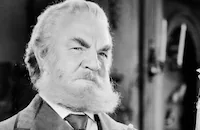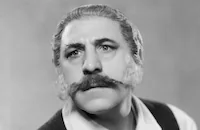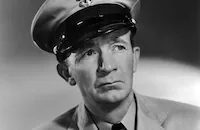Half a Sinner
Cast & Crew
Kurt Neumann
Joel Mccrea
Sally Blane
Berton Churchill
Alexandra Carlisle
Mickey Rooney
Film Details
Technical Specs

Synopsis
"The Deacon" Caswell is actually a cardsharp, and nearly loses his life one night while playing with some hoboes in a boxcar, but is saved by John Adams, a young man who is lying low. When the train stops, Phyllis hops on dressed as a boy, but some of the men discover her disguise and become threatening. Once again John comes to the rescue, and the pair jumps off the train. Some time later, John and Phyllis have settled in Harrington, Kansas, where Phyllis is working as a desk clerk at the hotel, and John works as a mechanic at Noel Cunningham's garage. When the Deacon checks in at the hotel, owner Mrs. Mary Clark confesses to having gambled at bridge, and when he confesses to playing a little himself, she brings him in on her game that evening. The Deacon keeps his previous acquaintance with John and Phyllis secret, much to their relief. Wrestler Crusher Bozoni and his manager "Slim" Sullivan are guests of honor of the local Beaver's Club, which has arranged a wrestling match between a volunteer and Bozoni. When they learn at a luncheon at the hotel that Bozoni is unable to make the match, Mrs. Clark's son Willie suggests that John substitute for him. If he lasts twenty minutes in the ring, he will get fifty dollars from the backer, Noel Cunningham, even if he does not win, and he can pay off the engagement ring he has given to Phyllis. John lasts the allotted time, but when he goes to collect his money, Cunningham refuses to pay him, and John hits him. John is arrested after Cunningham charges that he stole his wallet. Phyllis finds the wallet underneath John's pillow where it was placed by Cunningham, and takes it, but Sullivan sees her and, as he works with Cunningham, he convinces her that she could not withstand the pressure of being a witness for John and that she should leave town. Mrs. Clark bails John out using her hotel as collateral, but Cunningham warns her and the Deacon that he framed John and that he intends to take Mrs. Clark's hotel as payment for all the I.O.U.'s she unwittingly signed. The Deacon involves Cunningham and the salesman who sold John the ring in a game of poker, and wins back the notes on the hotel and the engagement ring. Meanwhile, John finds Phyllis and brings her back to town, and she reveals to the sheriff that Sullivan gave her a reference letter to a woman running a speakeasy in Chicago which implicates Sullivan in recruiting unsuspecting women for prostitution. Sullivan tries to escape, but Willie brings him down with a football. The Deacon returns the notes to Mrs. Clark, and Phyllis' engagement ring to her and John's name is cleared. With peace restored, the Deacon takes the sheriff's warning to leave town, so that he will not be arrested.

Director
Kurt Neumann
Cast

Joel Mccrea
Sally Blane

Berton Churchill
Alexandra Carlisle

Mickey Rooney

Guinn Williams

Russell Hopton
Spencer Charters
Reginald Barlow

Henry Armetta
Gay Seabrook
Theresa Maxwell Conover
Bert Roach

Walter Brennan
Maurice Black
Clarence Hummel Wilson
Fred Kohler Sr.
Charles Murphy
Johnnie Morris
Blanche Payson
Fred Toones
Gertrude Simpson
Jerry Mandy
Harry Northrup
Robert Mckenzie
Crew
Archie Buchanan
Philip Cahn
Connie Earl
Stanley Fleischer
Roman Freulich
John P. Fulton
Edmund Grainger
Gertrude Helmer
Gilbert Kurland
Carl Laemmle Jr.
Carl Laemmle
Carl Laemmle
Fred Levi
Clarence Marks
Marcella Morin
M. F. Murphy
George Robinson
Earle Snell
Ralph Spence
Joe Torillo
Mary West

Film Details
Technical Specs

Quotes
Trivia
Notes
Berton Churchill originated the role of "The Deacon" during the Broadway run of the stage play. The pre-release title of this film was Alias the Deacon. Film credits and the plot summary are based on a studio screen continuity. Some scenes were filmed on location in Chatsworth, CA. John Hymer and LeRoy Clemens' play was first filmed in 1927, when Edward Sloman directed Jean Hersholt, June Marlowe and Ralph Graves in Alias the Deacon for Universal (see AFI Catalog of Feature Films, 1921-30; F2.0083). In 1940, Universal remade Hymer and Clemens' play as Alias the Deacon.












